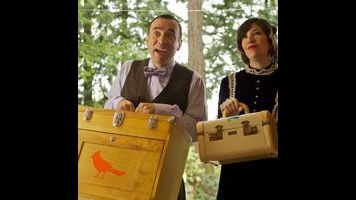In the past year, nostalgia for the ’90s has really caught fire in the culture; a period that was widely seen as unforgivably compromised and half-assed by a lot of young people, and that saw aging Boomers lamenting the fact that their generation hadn’t had a catastrophic event like World War II that would give them a chance to be tested and prove their worth to stand proudly aside the Greatest Generation of their parents, now seems like a lost golden age. In memory, at least, the period between the end of the Cold War and the beginning of the War on Terror feels like a time when things at least more or less worked, and the stakes were so blissfully low that the whole country could just take a year off from even discussing its actual problems and instead listen to politicians and reporters just talk about the President’s sex life. Maybe that’s part of the reason that Portlandia seems to have generated a lot more media interest this winter than the first season did a year ago. In its fond regard for post-counterculture hippiedom and the dream of an eternal Lollapalooza tour, the first season was ahead of the curve, but only by about 15 minutes.
The opening sketch in tonight’s episode nails the show’s favorite tone, which, in a spirit of reductionist convenience, I like to think of as “punk rocker who’s learned to live in this world by admitting that she likes some things but is still cool enough to feel sheepish about it.” It’s an Invasion Of The Body Snatchers spoof in which Fred Armisen and Carrie Brownstein discover that everyone around them—store clerks, the guy at the bank, friends, frenemies, family members—has become a DJ. People press fliers on them and say things like, “I play rockabilly, hillbilly, and shockabilly.” There’s a basis of, if not outrage, at least irritation to the joke, which is balanced by a degree of acceptance that shades into affection: you can practically hear the writers thinking, “There’s too many would-be DJs in this town, it’s really driving me nuts!” and at the same time thinking, “Thank God I don’t live someplace where there are worse things than this to complain about.” There’s a similar tone, and a wonderful level of satirical precision, in another sketch about a couple of gutter punks who incorporate a dog into their panhandling routine and discover that pitch lines like “Hey, our dog’s trying to get to Europe. Do you have any money?” work better for them than just asking, “20 cents for some ice cream?” Given how small these sketches are, the little things matter a lot. The people who worked on the older sketch shows I mentioned earlier put a lot of concentration on the details, too, but they liked to go for the occasional mural. Armisen and Brownstein are miniaturists at heart.
After a strong start to this season, Portlandia has settled into a pleasant but unspectacular groove this past couple of weeks. The biggest sketch tonight, about a couple of overachiever parents trying to get their tiny son into the right preschool, is built around the video they present to the kid’s prospective teacher; it has a couple of solid laughs, especially when Brownstein is making her case for her son’s “specialness” while the words “PRESENT AT GROVER’S BIRTH” flash across the screen. It suffers, though, from the fact that the characters are exactly the kind of people for whom Armisen and Brownstein don’t feel any special kinship or affection. It only really takes off at the very end, when it slips into surreal madness, with the parents slipping off to the bedroom for a celebratory quickie, except that they both do their loudest moaning when one of them has left the room. That kind of lunacy only manifests itself here in drips and dabs, as in some of the lines in the dog-park sketch (“Whose dog is that, with the lips that are falling off?” “Hey, the barking? I don’t need it!”) and the ending of a more or less inexplicable sketch featuring Armisen as a dwarf on a scavenger hunt. Armisen and Brownstein have too much love for what they’re satirizing to get out the razors on it, which is fine by me; these days, TV comedy that’s smart and weird without being out for blood is a rare and wondrous thing. But if they’re going to make it to the end of this season without sagging, it would help if they could get crazier more often.
Stray observations:
- Brownstein on Grover: “His first word, he was starting to say, ‘Da… ,’ ‘Da… ,’ and we thought, here it comes: ‘Dad.’ He actually said, ‘Daedalus’, And he went on to teach us about the Icarus myth…”
- Oddly enough, the scene in the dog park with Armisen loudly explaining that the ball he’s brought to play with his dog is not a “share ball” plays as an answer record to a scene from the series finale of Rescue Me. It works a lot better with a dog in place of Denis Leary’s grandchild, and with Fred Armisen in place of someone you’d like to see torn apart by wild boars.

